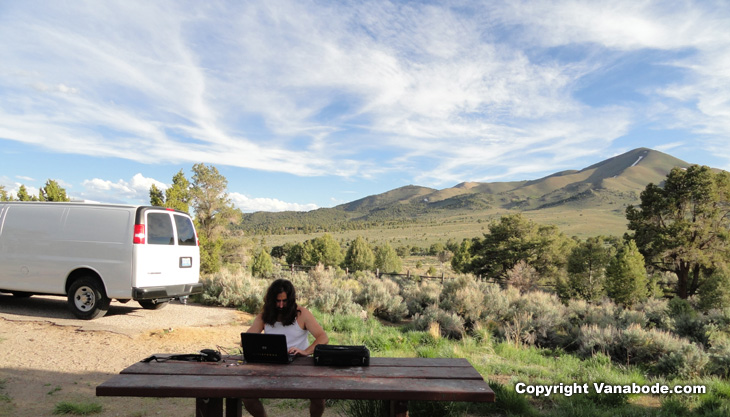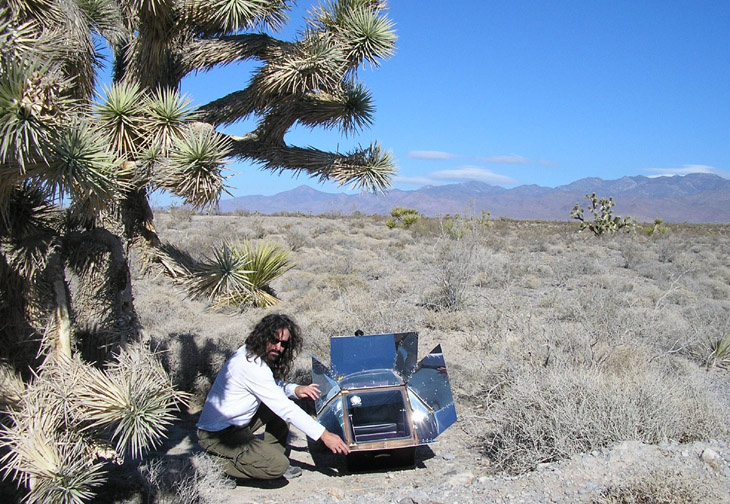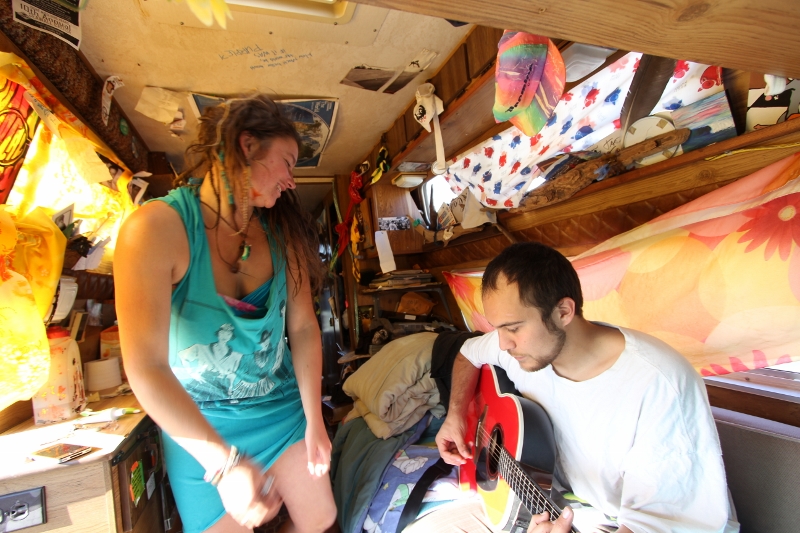While moving into one’s vehicle may seem like the ultimate defeat — a nightmare-turned-reality by an eviction notice or a lay-off — a seemingly growing number of employed independents are ignoring the stigma that shrouds car living, and embracing it as a viable, and perfectly happy lifestyle.
Could the degenerate connotations that surround living in a van down by the river be rapidly changing?
“Being homeless and a working professional are no longer mutually exclusive,” writes Eric Spitznagel of Bloomberg Businessweek in his recent article Living in Your Car: No Longer Just for Bums.
Spitznagel cites a 2009 census by the National Coalition for the Homeless which found that roughly 44% of homeless people in the United States are employed.
“Although the U.S. Census Bureau doesn’t keep records of the so-called vehicular homeless,” writes Spitznagel, “there are informal estimates that up to 59.2% of homeless are living in cars or vans, the biggest percentage since the Great Depression’s ‘Ford families.”’
Van sales were up 24% in 2011, according to the auto-information company Edmunds.com, so the “informal estimate” may carry some weight.
The only difference between today’s going-mobile movement and those who did it during the Great Depression, Spitznagel points out, is that for many gainfully-employed Americans, “a house on wheels is a lifestyle choice,” and not a situation they’re being forced into.
This is true in the case of many 20-somethings interviewed for this article, including recent college graduates facing massive school debt.

Vermont-born Nicholas Korda, 27, has been living in a retrofitted ambulance since 2010.
“I’m living in Boulder, Colorado, and it’s pretty expensive, and I just thought, ‘how am I supposed to do the things that I want to do in life and still pay off college?’ I couldn’t rent anymore. No way. I was just done,” said Korda.
Korda works as a freelancer on a myriad of projects, including work for Green Guru Gear, a company that makes eco-adventure gear from upcycled materials. He says the $1,500 vehicle paid for itself within the first year, and he’s saved between 12 and $24,000 since moving into his vehicle, and almost completely paid off his school loans while doing it.
Korda’s van is customized to run on veggie fuel, and it’s equipped with a sailboat wood stove.
And there are other car-dwellers scattered all over the continent. Like Jessica Spaulding, 31, who owns two apartment buildings in Arizona but lived in her hybrid van—for five years—just because she loved the freedom.
Janicka Grayston of British Columbia, bought her first camper six years ago, and calls herself a “home owner for the last six years.”
“Gas, insurance and maintenance replace rent,” said Grayston. “My backyard is ever changing, and often most gorgeous… Whenever I’m feeling the urge to explore, I just have to turn the key, no need to pack or worry about accommodation it’s all there ready to go!”
And there’s Jason Odom, who lives in a white Chevy van in Florida with his wife, and wrote an entire book about the past 17 years doing so called Vanabode: Live Forever on $20 a Day.
Odom even writes an entire chapter called “Disappear” which covers how to remain anonymous while on the road, undetected by former debts, bad memories, or stalkers. More of Odom’s valuable Vanabode — yes, he trademarked the term — insights in the final section of this article.
Whatever your reason for taking to the open road, a bit of research is highly encouraged. The following interviews of van-dwellers are rich with advice, and a good place to decide whether or not you have what it takes.

Wisdom of The Road: A Temporary Way To Save Cash
In Santa Cruz, California, the obvious house-van is a common sight. They flank the ocean cliffs, rest discreetly on mountain roads, and join the metal and rubber tent city that has sprouted on the stretch of Highway One between Santa Cruz and the tiny town of Davenport. Off the beaten path from police officers, this particular pod of cars only popped up over the past five years, and it swells to over 50 on some nights, much to the frustration of coastal farmers who find trash in their fields.
I didn’t have to look far to find my first once-a-van-dweller. He lives upstairs from me.
Carl King, 28, is a mechanic who had a full-time job when he moved into his 4 Runner for almost a year. He did it to save money, which he owed his parents, and just because it “made sense,” he says.
“I was renting a small crappy studio the size of my bathroom now,” said King, who now rents a house with a garage for $1275/month. “It was super small, no kitchen, for $600 a month. I just decided it wasn’t worth it and I’d be better off sleeping in my truck and staying with whoever.”
After initially sleeping in a Toyota pick-up truck with a cab, King decided to upgrade to a 4 Runner, mainly for safety reasons.
“If I was somewhere sleeping, I’d have to exit the truck and get into the cab to drive away and I didn’t like that,” said King, who made the switch after waking up to a “tweaker” flicking his lighter and peering into his truck, then trying the handle before scuttling away when King yelled.
King said he never got the best quality sleep during this period of his life, because he always have to be on guard, but having an enclosed vehicle like a van or 4 Runner (or ambulance) will help with piece of mind—because you may need to drive away. Jason Odom recommends a nondescript white van as the most inconspicuous choice of vehicle.
Where to sleep: in front of friends’ houses, and out on the fringes of town, said King. Others recommend church parking lots, grocery store parking lots, and camping in National Parks.
While King made sure to keep his bedding rolled up and out of sight during the day, in an attempt to deflect unwanted attention, others don’t even bother hiding the fact that they’re living in their car. I guess it’s a personal preference.
Josh White, 26, lived in a “classic Soccer Mom” van for seven months in Santa Cruz and other parts of California.
“I’ve heard stories of people taking cargo vans and pretty much tearing out the insides, putting in sinks and stoves and full cabinets and such,” said White. “I just took out the seats, threw a twin sized mattress in the back, duct taped some paper over the windows so no one could see in, and called it a day. Not the most elegant of setups, but it worked.”
Both White and King maintained a gym membership during their van periods, where they could shower, brush their teeth, and use the toilet. Occasionally, they even worked out!
Aside from the obvious benefit of saving large amounts of money not paying rent, both Carl and King said that living in their cars also f them to be more social.
Why? Well, if you live within four walls, think about how much time you spend there, watching TV on the couch, lounging, cooking dinner, weeding your garden, or whatever it is you do. Then imagine not having that.
“I’m normally the type of person who will sit in his room reading or screwing around on the Internet,” said White. “Not having that place to hang out forced me to go out to public places, meet people, and generally be more social. I met a lot of really interesting people, both at bars and coffee shops in Santa Cruz and traveling around the state.”
King has a similar story: aside from coffee shops for Internet access, he killed time at the park shooting hoops, at friends’ houses, and studying in the local college library. He even met his then-girlfriend in the sauna at the gym where he also spent a lot of time.
Nicholas Kordas says living in his vehicle has been socially significant for him as well:
“The vehicle in my life is a filter for me,” said Kordas. “For my friends, for the girls I want to date, for the people I want to spend my time with. I want somebody who is going to want to not mind getting dirty, who likes to go climbing, who makes the best out of small things and likes being thrifty.”
Aside from the freedom, the low bills, and the social benefits, van dwelling also means long hours of contemplation.
“At times I got really stressed out about the fact that I was a college graduate living in a van,” said White. “But I used those occasions as a sort of soul-searching opportunity to figure out what I really wanted in life. I think that I learned a lot about myself, even if I can’t really articulate exactly what it was.”
A Van-Abiding Veteran: Making it a Permanent Lifestyle

Going mobile to save up some money and then returning to a more conventional way of life is common. Then there is Jason Odom, who has done it for a very long time, doesn’t plan on stopping any time soon.
Odom, 45, has ticked off 17 years living in his white Chevy van with his wife, Kelly.
“At first we did not have any other dwelling place,” said Odom. “We traveled for years driving a tractor trailer, then for years in a small class C camper, then for years in a 34-foot large Class A, then for years in the Vanabode, which allowed us to save money to pay cash for a house. We now stay in the house part of the year then use the money from renting it out seasonally to travel the other part of the year.”
Drawing on his past 17 years, Odom’s book Vanabode: Travel and Live forever on $20 a Day is a complete guide to making the shift to van life, and it’s written with amusing honesty, covering the nitty gritty details like what to do if you wake up in the middle of the night and need to go “number two,” and how to keep your romance and love relationship thriving and healthy when you share a small box with your beloved.
For Odom, it’s about enjoying life just a little bit more, without having to spend tons of money:
“This lifestyle is about cost reduction and the enhancement of your life by spending time living a fun life now rather than working and trying to save enough money to buy a fun life later,” said Odom.
The trademarked term “Vanabode” means: “to be on an adventure without much sacrifice. You can have all the essentials that make a life enjoyable: excellent food, laughter, fun, big romantic adventures, healthy sex, protection from the weather, and a good nights sleep at very little cost. The best thing is it is sustainable: you can happily, safely and affordably Vanabode for many years or even for the rest of your life.”

A Few Invaluable Tips for Vanaboding From The Experts:
1. Getting Questioned by the Police:
There is actually nothing to fear, Odom points out, and in 17 years he’s only been woken up and questioned twice.
If woken up in the night by a police officer: be polite—they are just doing their job. Don’t answer the knock with a weapon in hand, obviously, and don’t have open containers of alcohol in your van, even if it is your home, it’s still a vehicle, says Odom.
The police officer will most likely ask you what you are doing there, and Odom advises to explain that you drove a long way that day and you wanted to rest so that you don’t get in an accident. The officer may tell you to move on because it’s illegal to sleep there, or if you’re lucky, he might “hint” that he won’t be returning to the area that night, in which case you can go back to sleep.
And speaking of sleep, Odom’s chapter on getting deep sleep offers valuable advice for finding the best spots (if you have a white van like his, for instance, parking next to a row of delivery vans at Sears will make you camouflaged forever), and best tactics to avoid nighttime interruptions. If you’re seriously considering moving into your wheels, this book might be a valuable packing item, especially because Odom offers his customers his lifetime guidance via email should they have further questions on the road.
2. Make Money On the Road
A web designer himself, Odom points that going mobile doesn’t mean going moneyless. In fact, you should probably have some income to pay for your fuel. Here’s a few of his ideas for how to make money on the road, which includes freelance gigs, writing an ebook, selling on eBay and working at National Parks.
3. Eating Right on the Road:
Along with good hygiene, ingesting healthy foods is an essential component of happiness, says Odom, who carries a cooler to store raw food straight from the farmers market. “The fuller you keep the cooler the longer the ice lasts,” advises Odom. A plastic tub for non perishables in a cool, shaded part of the van takes care of other essentials.
He also uses a solar oven and a propane gas stove.
4. Finding a Shower
If you move into your van, and you’re living in the same city, then a gym membership takes care of most of your personal hygiene needs.
If you’re on the road, Odom recommends getting well acquainted with a sponge bath over a plastic tub in the privacy of your van. But if you want a real shower, try truck stops or camp grounds. “In many cases you can skip the cost though and simply drive in and around the campground until you find the shower facilities. Then park and take a quick shower and leave,” writes Odom.
Also take advantage of single user bathrooms, found in small restaurants, convenience stores and gas stations. They usually have “everything you need to take a hot sponge bath, shave, use the toilet, sanitize, floss and brush your teeth, and get a good look at your face in the mirror,” writes Odom.
5. Making A Bed:
Maybe all you need is a bedroll or a twin mattress flung in the back, but if you’re really into the Feng Shui of van life, or if you just want to have optimal living conditions here is a detailed link for how to construct a true bed on wheels.









